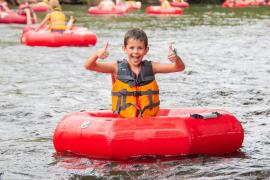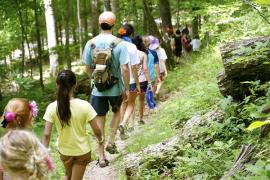Hi everyone,
My name is Victoria Povilaitis and I am a research assistant at the University of Utah. You may remember me from such blogs as "From Camp Pro to Camp Researcher: Introducing ACA's New Research Assistant," "Staff Workforce Development: What Helps and What Hinders It," and "Calling All Camp Enthusiasts! A Special Issue of Camp Research Is Here." Since writing those, I have continued on to work with Dr. Jim Sibthorp and his research team at the University of Utah. We have been doing research with camp families and staff as a part of ACA’s Impact Study. ACA Director of Research Dr. Laurie Browne discussed some findings from Phase 2 of the Youth Impact Study in a recent Research 360 blog, so today I’m going to tell you a little bit about what we are doing in Phase 3.
For this phase of the Youth Impact Study, we are working with approximately 450 families who were recruited from a diverse sample of ACA-accredited camps from across the United States. About three times a year, we ask them to complete surveys that explore a range of different topics, including the decision to send a child to camp, the outcomes that a child experiences at camp, and how these outcomes may impact a camper outside of camp, like at home and at school. This fall, we asked families to complete a survey, but also to participate in an interview with a University of Utah research team member to explore the camp experience from the family perspective. While most families we spoke with consisted of a parent and their camper, some were grandparents or other legal guardians, but for the purpose of this blog I will refer to them as parents.
Interviews took place over a two-month span, and parents signed up for a time slot that would work for both them and their child. While we have quantitative data from the surveys, it’s important to actually talk to parents and children to hear about camp in their own words. We felt it was important to have a parent and child talk about this experience together because the dynamic between parents and children may help bring out stories or anecdotes that a one-on-one conversation may not be able to elicit. It’s kind of tricky to get a ten-year-old to talk sometimes, and parents know their child best! In the end, we had six researchers who interviewed about 240 parents and their children about their summer and their time at camp, factors that influenced the decision to attend camp, and perceived and actual outcomes of the camp experience.
Since I completed many of the interviews myself, Laurie asked if I would write a Research 360 blog post about some of the things we’re learning when talking with these parent and camper pairs. Of course, I happily agreed — there’s nothing I love more than sharing research with the camp community! Keep in mind the University of Utah team is only beginning to take a look at the data and explore it further, but here are some of the things we’re learning — hot off the press!
1. Families Prioritize Vacation and Summer Camp
When asked what “the first piece of the puzzle” is for organizing the summer schedule, parents typically responded with family vacation or summer camp. It seems that summer is a time for many families to capitalize on opportunities to spend time together. Some parents have time off work and are able to take vacations with their child(ren) out of town, out of state, or even overseas. In addition, family reunions or vacations with extended family are often planned well in advance, as it’s a challenge to coordinate so many schedules. Other families like to plan “staycations” and explore their local area, or go to amusement parks, museums, or beach trips. As summer camps often fill up quickly, some parents prioritize registering for camp and plan the rest of the summer around their child’s camp schedule.
2. Reasons for Day Camp Versus Overnight Camp
After speaking with parents, it seems each family has their own unique reasons for sending their child to camp. On the one hand, many parents are looking for niche day camps that focus on one specific topic or area of interest for their child. For some this may be STEM-related, sport-specific, arts-based, or something as specialized as marine biology. On the other hand, many parents send their child to overnight or residential camp with the expectation that their camper will receive a more “traditional” summer camp experience, rife with outdoor activities, campfires, and s’mores. Parents always want their child to be safe and happy, but depending on the type of camp they attend, the parental expectations of skill-based outcomes seem to vary.
3. Kinds of “Camp Kids”
Thinking back to the old-school camp movies, it seemed like everyone who attended sleepaway camp was there for the entire two months of summer. As it turns out, that’s not the norm anymore. While there’s still the stereotypical “camp kid” that goes to one overnight camp all summer long, there are many campers that go to one week of day camp or one week of overnight camp. There are also other campers who attend overnight camp for a week or two, and then later in the summer go to day camp. There’s even the kid who goes to a different kind of day camp every week of the summer.
Well, that’s all I will share for now. These are just preliminary things I’ve noticed in the interviews that I have completed, and are by no means an exhaustive list of what we’ve found. The research team will be analyzing these interviews in greater detail to determine, from a scientific perspective, how camps can best meet the needs and expectations of parents today.
If you’re interested in the Youth Impact Study, keep watching the Research 360 blog as well as Camping Magazine for more posts and articles. In addition, we will be discussing our findings from the various stages of the Youth and Staff Impact Studies at the ACA National Conference in Nashville February 19–22. If you see me, come say hi and we can chat more about camp research. Hope to see you there!
Victoria Povilaitis, a research assistant and doctoral student at the University of Utah, has worked in the camp industry in a variety of roles, including staffing coordinator, athletic director, and sports coach.
Photo courtesy of Camp Highland in the Horse Shoe, North Carolina
Thanks to our research partner, Redwoods.

Additional thanks goes to our research supporter, Chaco.
The views and opinions expressed by contributors are their own and do not necessarily reflect the views of the American Camp Association or ACA employees.



